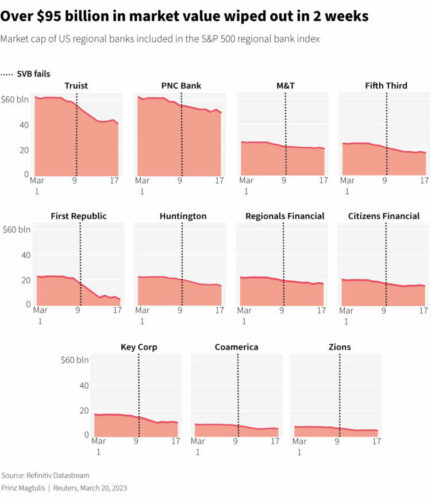
By David Milliken, John Revill and Aniruddha Ghosh
(Reuters) – The Bank of England on Thursday followed the Federal Reserve and the Swiss National Bank in ploughing on with interest rates hikes, saying the UK banking sector was strong enough to withstand the instability that rippled through markets this month.
Relentless rate hikes to rein in inflation are among factors blamed for the worst banking sector stress since the 2008 financial crisis and investors had questioned whether the central banks could press on with tightening policy.
The collapse of two U.S. lenders earlier this month triggered turmoil in banks around the globe, ensnaring one of Europe’s biggest banking names in 167-year-old Credit Suisse AG.
After its eleventh straight hike, the BoE said it had noted the “large and volatile moves” in financial markets, but that Britain’s banking system remained resilient.
“We’ve had events in the last two weeks particularly which have signalled problems that have had to be dealt with in the global banking system. And there has been very prompt action,” BoE governor Andrew Bailey told broadcasters.
“We have learnt a lot of lessons from the financial crisis. Of course we keep learning lessons, but I’m confident that the banks in (Britain) are in a much stronger position,” he said.
While recent market jitters have eased, they have prompted investors to adjust to more challenging economic and lending conditions ahead.
The index of top European banks was down 1.7%, with German banking giants Deutsche Bank and Commerzbank falling 2.1% and 3.2%, respectively. London-headquartered HSBC dropped 2.5%.
U.S. banking shares fared better, with some traders citing Fed’s hints that it was on the verge of pausing further increases in borrowing costs as a source of some relief.
Troubled U.S. regional lender First Republic Bank, which is among banks speaking to peers and investment firms about potential deals, rose 5% on Thursday.
Other U.S. banks under the microscope in the wake of U.S. regulators’ taking over Silicon Valley Bank (SVB) and Signature Bank also gained. Western Alliance Bancorp jumped 5% and PacWest Bancorp and Truist Financial Corp gained between 1% and 4%.
BANK BOND PRESSURE
Earlier on Thursday, the Swiss National Bank raised its benchmark interest rate by 50 basis points and said Credit Suisse’s takeover by its Swiss rival UBS had averted a financial disaster.
Swiss authorities had urged the banks to come together and offered financial guarantees worth up to 260 billion Swiss francs ($280 billion) to get the deal done.
“At this moment the focus has to be that we can maintain financial stability and that the closing of the deal is smooth and fast,” SNB Chairman Thomas Jordan told a news conference.
Citigroup downgraded Europe’s banking sector, warning the rapid pace of interest rate hikes will further weigh on economic activity and lenders’ profits.
“The European banking sector’s fundamentals look healthy. But the ongoing confidence crisis could limit banks’ risk appetite and reduce the flow of credit,” Citigroup equity strategists said.

(Graphic: Over $95 billion in market value wiped out in 2 weeks – https://www.reuters.com/graphics/GLOBAL-BANKS/USA/myvmobkeovr/graphic.jpg)
The rescue of Credit Suisse ignited broader concerns about investors’ exposure to a fragile banking sector.
Switzerland’s financial market regulator FINMA on Thursday defended its decision to impose steep losses on some of Credit Suisse bondholders as part of its rescue, saying the move was legally watertight.
The decision to prioritise shareholders over Additional Tier 1 (AT1) bondholders rattled the $275 billion AT1 bond market and some Credit Suisse AT1 bondholders were seeking legal advice.
The convertible bonds were designed to be invoked during rescues to prevent the costs of bailouts falling onto taxpayers as it happened during the global financial crisis in 2008.
Asian policymakers are also seeking to calm investor nerves about AT1 bonds but the ongoing turbulence is likely to keep a lid on fresh debt sales.
Hong Kong and Singapore central banks said they would stick to the traditional hierarchy of creditor claims if a bank was to collapse in their respective jurisdictions.
However, the volatility may prompt at least two Japanese banks, Mitsubishi UFJ Financial Group and Sumitomo Mitsui Financial Group, to put AT1 issuance on hold, two sources told Reuters.
Policymakers from Washington to Tokyo have stressed the turmoil is different from the crisis 15 years ago, saying banks are better capitalised and funds more easily available.
Yet politicians are also wary of public perceptions that banks are being bailed out again, after anger over the sector’s costly rescue in 2008. U.S. authorities say the recent support for SVB, in which all the bank’s deposits were protected, did not amount to a taxpayer-funded bailout.
The U.S. Senate Banking Committee on Thursday called on the former chief executives of SVB and Signature Bank to testify as lawmakers weigh possible action.
“You must answer for the bank’s downfall,” the panel’s Democratic chairman and ranking Republican wrote in separate letters to former SVB Chief Executive Gregory Becker and former Signature Bank CEO Joseph DePaolo.
($1 = 0.9280 Swiss franc)
(Reporting by Reuters bureaus; Writing by Toby Chopra; Editing by Tomasz Janowski)


